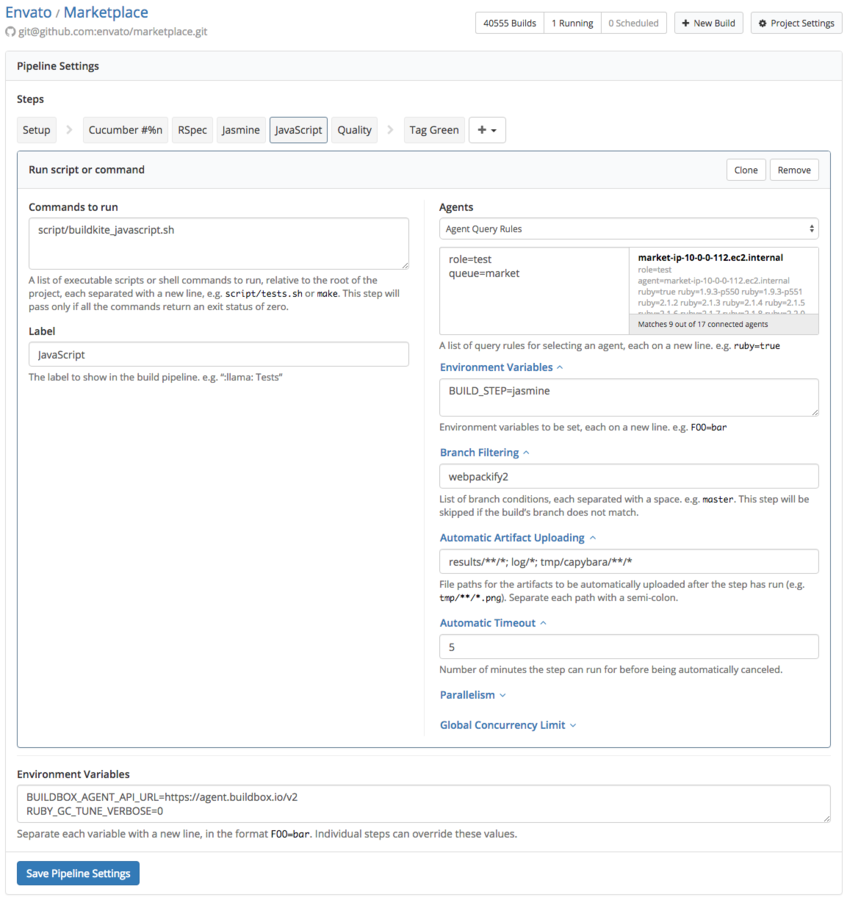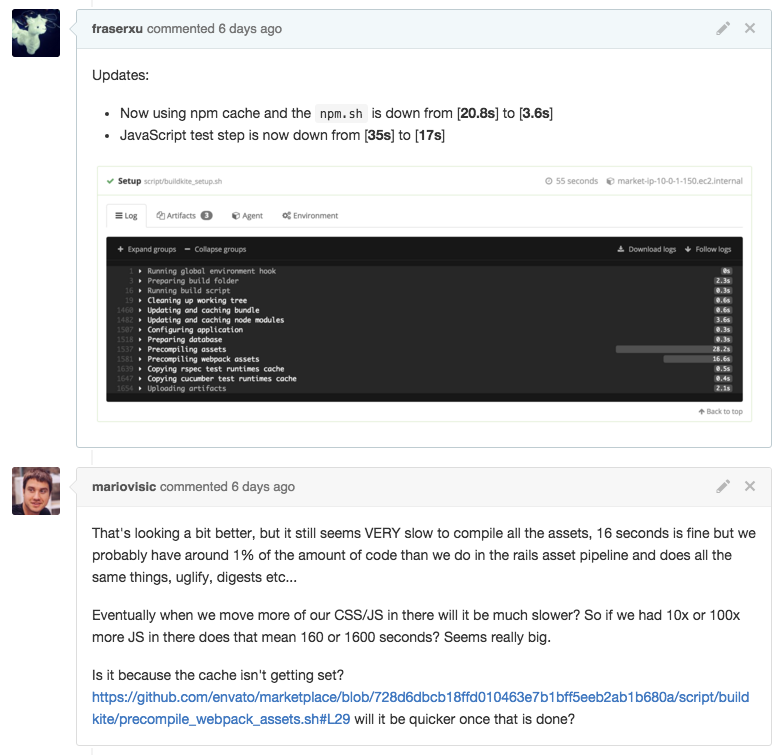Adding Webpack to Rails
@fraserxu
Adding Webpack to Marketplace
Why?
- React-rails gem
- Global variables(React)
- Non standard ES6(module) code
- Sprockets manage assets
- Hacky to test(mock, code transform)
<%= content_tag :div,
:class => "home-search__search",
:data => {
:view => autosuggest_viewloader_attribute,
:react_components_path => javascript_path('market/pages/homepage/components/autosuggest'),
} do %>The problem need to solve
- Don't break the existing code
- Don't change the way people work
- Progressive enhancement
- Developer experience(happiness)
- Testability, maintainability, reusability
- Deployment process(CI, staging, production, caching, CDN...)
The structure
.
├── README.md
├── app // app entry where we use to build the app
│ └── appEntry.js
├── components // react components
│ └── autosuggest
├── tests // tests for components
│ ├── autosuggest_list.test.js
│ └── autosuggest_list_item.test.js
└── webpack // webpack configs
├── webpack.client.base.config.js // shared config
├── webpack.client.rails.build.config.js // build webpack config with manifest
└── webpack.client.rails.dev.config.js // dev webpack config with live-compileAssets management
- compile assets into public/webpack
- also compile a public/webpack/manifest.json like sprockets' manifest
- use "/webpack/app.js" in development(will use webpack dev server in the future)
- use "https://abc123.cloudfront.net/webpack/app-bundle-def456.js" in production

webpack.rb
module Webpack
def self.manifest
@manifest ||= JSON.parse(File.read(Rails.root.join("public/webpack/manifest.json").to_s))
end
def self.asset_path(path)
if Rails.env.development?
"/webpack/#{path}"
else
"#{Rails.application.config.action_controller.asset_host}/webpack/#{manifest.fetch(path)}"
end
end
def self.javascript_path(file)
asset_path("#{file}.js")
end
end
{
"app.js": "app-10f44fcd836cfb718328.js",
"vendor.js": "vendor-da69203f114ff6e7e25f.js"
}manifest.json
Writing ES6 and React Code
- Write standard React component
- + *Componentify(expose module)
- + Inject React and ReatDOM in a separate file
- + LoadOnce script to page(vendor + app)
- Render(mount) to page
// import 3rd party modules, could be any modules from npm
import React from 'react'
import ReactDOM from 'react-dom'
// internal modules, usually your actually code
import AutosuggestComponent from './_autosuggest_list_component'
// here we create a AutoSuggest Object with a `renderOn` method,
// the reason behind this is that we don't want to make React and ReactDOM as global object provided by Rails
const AutoSuggest = {
// The render on method inject the react props and DOMNode as params
renderOn (props, reactMountNode) {
// here we create a reactComponent
let reactComponent = React.createElement(AutosuggestComponent, props)
// and render it with ReactDOM
ReactDOM.render(reactComponent, reactMountNode)
}
}
// export the Component and we will use it in the app Entry
export default AutoSuggest/**
* This the entry for all the React Component
* All the component are under EnvatoReactComponent namespace
* e.g, EnvatoReactComponent.AutoSuggest
*/
export AutoSuggest from '../components/autosuggest'config.output = {
filename: '[name]-bundle.js',
path: '../javascripts/dist',
library: 'EnvatoReactComponent',
libraryTarget: 'umd'
}class Views.AutosuggestReact
constructor: (@$el) ->
vendorBundlePath = @$el.data().vendorBundlePath
reactComponentsPath = @$el.data().reactComponentsPath
if reactComponentsPath
Market.Helpers.loadOnce([vendorBundlePath, reactComponentsPath]).done =>
@_initialize()
_initialize: =>
@$searchInput = @$el.find('.js-term')
@analyticsParamInput = @$el.find('.js-autosuggest-analytics-param')[0]
@reactMountNode = @$el.find('.js-react-mount-node')[0]
@serviceEndpoint = @reactMountNode.dataset.autosuggestServiceEndpoint
@initialSuggestions = @reactMountNode.dataset.initialSuggestions
@_renderReact()
# GA Ecommerce tracking
new Market.GoogleAnalytics.Autosuggestion.init()
_renderReact: =>
initialSuggestions = JSON.parse(@initialSuggestions)
props =
$searchInput: @$searchInput
analyticsParamInput: @analyticsParamInput
initialSuggestions: initialSuggestions
socket:
channel: 'autocomplete:standard'
endpoint: @serviceEndpoint
throttleAmount: 50
if EnvatoReactComponent && EnvatoReactComponent.AutoSuggest
EnvatoReactComponent.AutoSuggest.renderOn(props, @reactMountNode)Testing
- Standard JavaScript code standard
- enzyme JavaScript Testing utilities for React http://airbnb.io/enzyme/
- Tape Why I use Tape Instead of Mocha & So Should You
- babel-tape-runner To be able to write test in ES6
- faucet Better tests reporter
- sinon Standalone test spies, stubs and mocks for JavaScript. We use it to test events in React.
- JSDOM JSDOM full redenering
- react-testing-recipes
Development process
TODO: Hot-reloading with webpack hot middleware
$ foreman startStaging server
NPM_CACHE_PATH="$CACHE_DIR/vendor/npm"
CACHE_NAME="nm_cache.tar"
export NDOE_ENV=production
if [ -z "$CACHE_DIR" ]; then
echo "Expected \$CACHE_DIR to be set"
exit 1
fi
# Make sure cache directory exist
if [ ! -d "$NPM_CACHE_PATH" ]; then
mkdir -p "$NPM_CACHE_PATH"
fi
# Make sure cache file exist
# Install node packages with cache support
if [ ! -e "$NPM_CACHE_PATH"/"$CACHE_NAME" ]; then
time (npm prune && npm install && tar -cf "$NPM_CACHE_PATH"/"$CACHE_NAME" node_modules)
else
time (tar -xf "$NPM_CACHE_PATH"/"$CACHE_NAME" && npm prune && npm install && tar -cf "$NPM_CACHE_PATH"/"$CACHE_NAME" node_modules)
fi
# Compile es6 code into es5
time npm run build
./script/samon/deploy_staging.sh
CI - Buildkite

./script/buildkite_javascript.sh
NPM Caching strategy
- No bundle check
- npm cache is still slow
The Problem
- Check cache by fetching tar file(with unique filename)
- If not exist, `npm install`
- If exist, fetch and extract tarball
The npm way
architecture=$(gem environment platform | cut -d ':' -f2)
hash=$(shasum -a 1 package.json | cut -d' ' -f1)
node_version=$(node -v | cut -d ' ' -f2)
filename="${hash}-${node_version}-${architecture}.tar"Because the way npm works we can ensure the cached node_modules always works given the same `package.json` on same OS and nodejs version, even for native modules that need compile
TODO: Private node cache server?
NPM Caching strategy
#!/bin/bash
set -e -x
NODE_MODULES="node_modules"
s3_prefix="s3://marketplace-ops/buildkite/cache/node_modules/"
architecture=$(gem environment platform | cut -d ':' -f2)
hash=$(shasum -a 1 package.json | cut -d' ' -f1)
node_version=$(node -v | cut -d ' ' -f2)
filename="${hash}-${node_version}-${architecture}.tar"
get_node_modules_cache () {
echo "Fetching node_modules from S3 npm cache"
aws s3 cp --region us-east-1 "${s3_prefix}${filename}" . && tar xf $filename $NODE_MODULES
}
npm_install () {
echo "Installing node_modules"
npm prune && npm install
}
set_node_modules_cache () {
echo "Updating S3 npm cache"
tar -cf $filename $NODE_MODULES && aws s3 mv $filename $s3_prefix
}
get_node_modules_cache || (npm_install && set_node_modules_cache)
The result

What's next?
Thanks!
Question and Feedbacks?
Adding Webpack to Rails
By fraser xu
Adding Webpack to Rails
- 1,868

